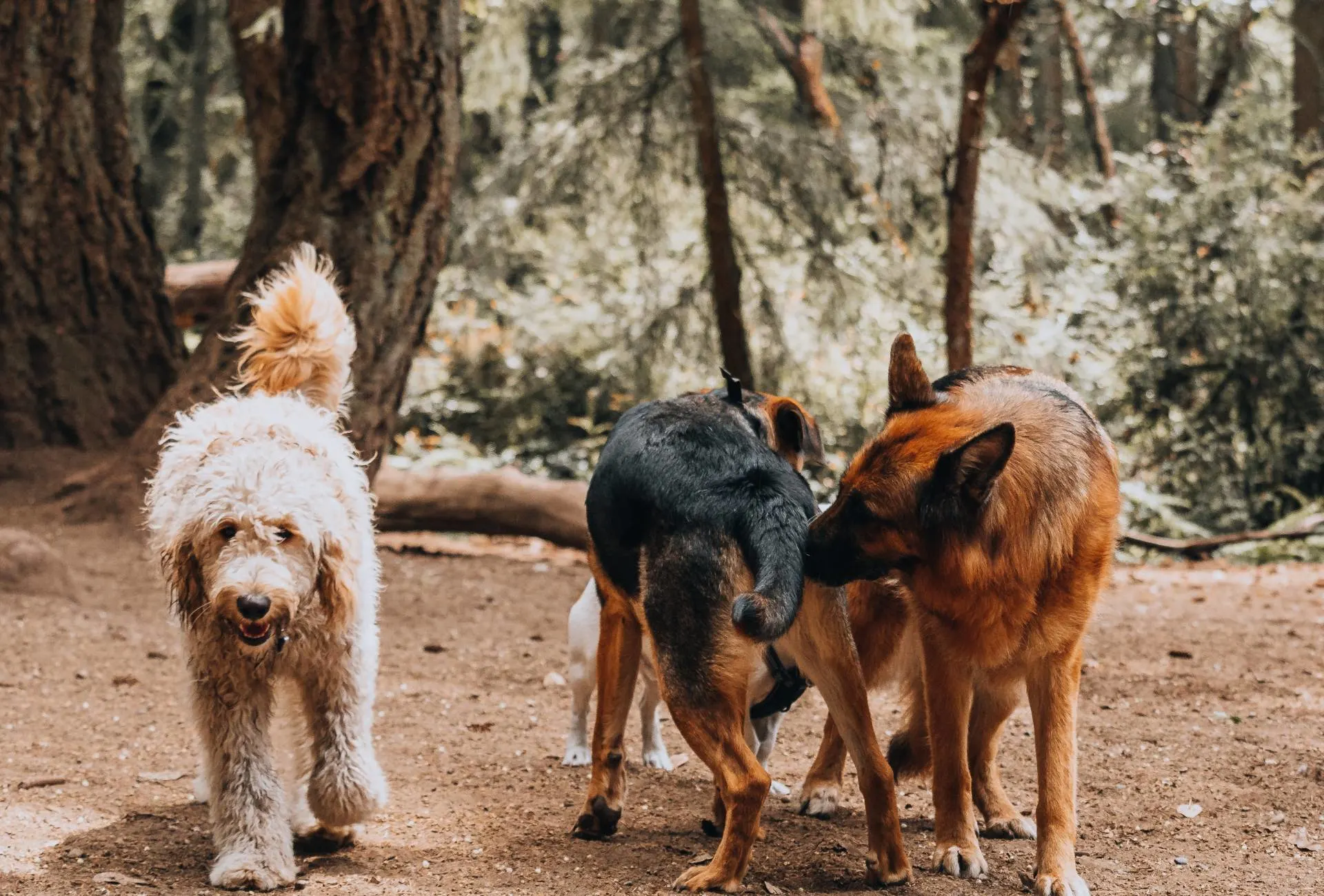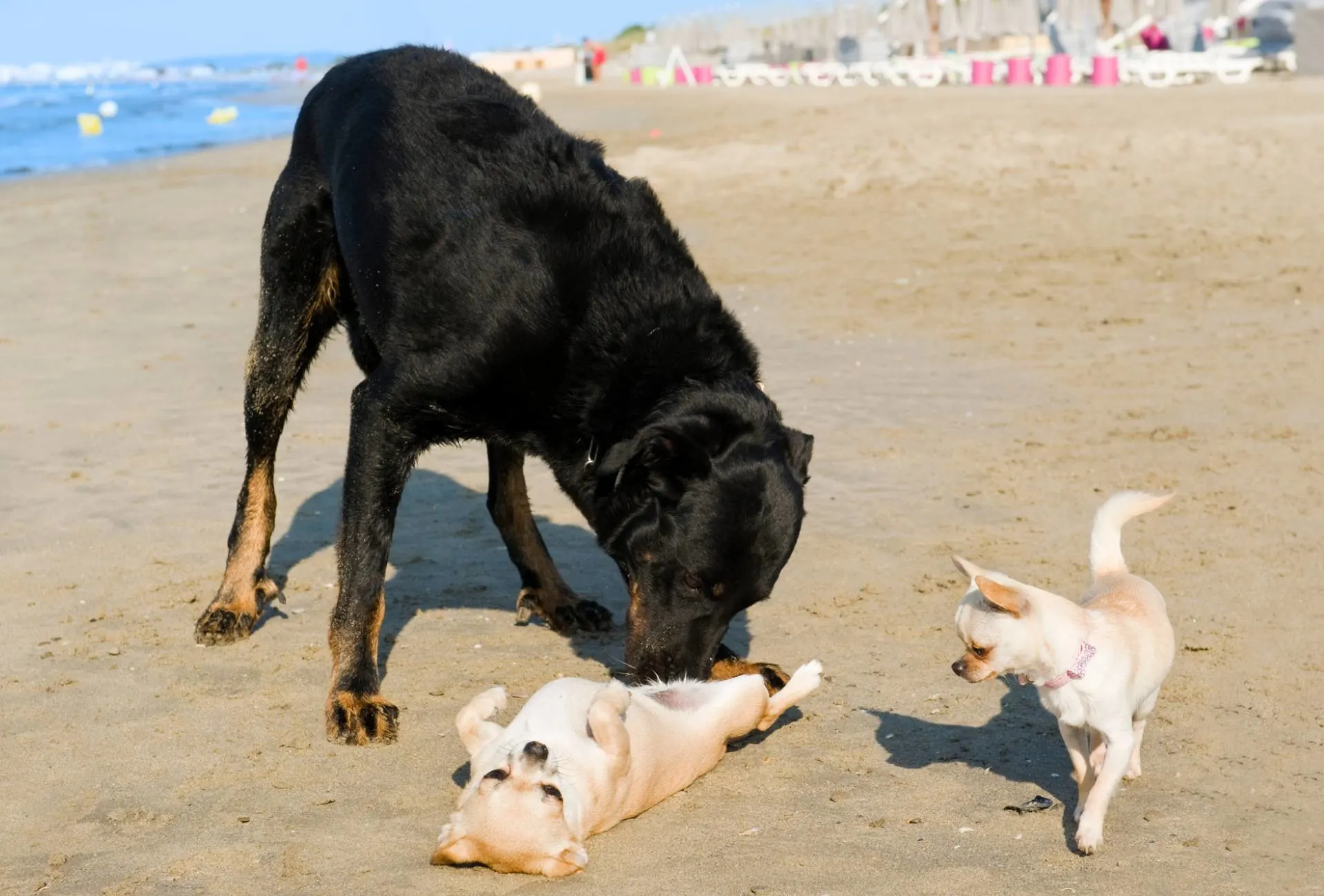Smelling the butt of a newly acquainted canine is often equated to the human handshake.
It’s a friendly way of saying hello while checking out their furry pal.
However, there’s an unwritten rule that dogs shouldn’t linger to the point it bothers other dogs.
Behaviors such as licking another dog’s privates become an issue once it gets excessive, which usually occurs after 10-15 seconds.
What equals “excessive” really depends on the circumstances, the dog’s behavior, as well as the duration of the smelling and licking.
There are some simple ways to stop that behavior but first, why do dogs do it?
Why Does My Dog Lick Other Dogs’ Privates?
Dogs lick each the private area of other dogs to say hello and gather information, assert themselves, groom the other dog, or because they sense a female in heat or a health issue such as anal gland disease.

While most dogs just smell and get a quick fix to say hello and gain insight, others do it due to a behavioral issue.
Misguided attempts to appease or assert themselves are among the behavioral issues that may cause excessive licking.
If your dog is licking the lips of a lot of dogs or behaves submissive, licking the private parts may be a misguided attempt to show submission by displaying affection and grooming.
On the other hand, the licking may also signal that one dog thinks they have the upper hand and decide when the party’s over.
If the licking is extremely one-sided and the other dog feels uncomfortable, that’s when an issue arises.
My Rottweiler can be a bit of a smell-aficionado sometimes and not all dogs appreciate that as she’s quite persistent.
However, I usually don’t intervene since before she starts force-smelling, she often lies down when meeting dogs or licks their lips which are usually appeasing signs.
Once other dogs respond negatively, it’s time to intervene. Some dogs just don’t appreciate all the fuzz about their bottom.

Simple grooming is also a possibility, although in that case licking is usually not limited to the private parts.
If you have a female canine who licks the private area of another female in heat, grooming may be a form of coping with that.
My female Rottie had that happen to her when she got her first heat and another adolescent dog followed her around in a benevolent attempt to keep her clean.
In general, if the female in question is in heat, that’s pretty likely to cause the rear-end obsession.
If your dog’s bottom is red and swollen that may also attract other dogs, especially if it has to do with bacteria growth or fungi which can emit a strong smell.
Dogs who are affected by a rear-end crisis should have a vet visit scheduled.
Also, there’s surprisingly little talk when you search this phrase about the anal glands.
Your dog’s anal glands are oval-shaped pouches left and right from your dog’s bottom (my article dives into potential issues).
These glands are believed to emit an odor that is stronger than urine which, in turn, attracts interested canines.
As mentioned in my linked article, studies estimate that anal sac disease affects around 5-15% of all dogs.
These glands are usually expressed when your dog is pooping, assuming that there’s no health issue and firm stool.
If you suspect your dog is struggling with health issues around the rear end or it smells funky, please schedule a vet visit.
Any health issues will usually be accompanied by other signs such as swelling, scooting, discoloration, discharge, difficulty when peeing or pooping, or simply a foul odor that even humans perceive.
But if multiple dogs are drawn to one other dog’s behind, it’s time to investigate.
Why Does My Older Dog Lick My Puppy’s Privates?
Licking a puppy’s privates can be a sign of affection and may serve as grooming, similar to what mothers do with their puppies.
It’s also part of a well-socialized dog teaching a pup how to appropriately interact with other dogs.
Young pups learn a lot through observation and interaction.
As long as your older dog is not licking the pup excessively, you should be fine with letting it happen.
Excessive licking may be the result of your older dog not being used to interacting with puppies or suffering from a physical or mental condition.
How To Stop My Dog From Licking Other Dogs’ Privates
You can stop your dog from licking other dogs’ privates by introducing a command such as “No” or “Stop” for undesirable behavior and encourage your dog not to linger too long.
It’s not advisable to punish your dog harshly for smelling or licking other dogs as that may have adverse effects.
The best way is to simply encourage your dog to do something else after the first round of smelling or as soon as the other dog feels uncomfortable.
Real issues arise when the other party is not a-okay with the behavior at all.
Some dogs just don’t like other canines sticking their nose into their downstairs affairs.
Should you encounter a dog who’s unwilling to have their private parts licked or even smelled, please prevent your dog from doing it.
Unless you’re in a controlled environment with a professional, it’s just not worth it and it’s easier to leash your dog and keep walking.
Some dogs are extremely in-your-face and if that’s yours, that’s okay but it’s important to keep in mind that not every dog falls into that category.
Dogs who haven’t learned to properly interact with other dogs might benefit from training sessions with professional behaviorists.
Some dogs just don’t learn to respect boundaries such as personal space and haven’t learned how to respond to the body language of an uncomfortable dog.
If you should notice issues in your dog with obsessive licking or even just smelling, observe and try to locate the trigger.
In cases where everything fails or you notice a behavioral or health issue, consult a professional behaviorist or veterinarian.
Disclaimer: This blog post does not substitute veterinary attention and does not intend to do so. I am not a veterinarian or pet nutritionist. If your dog shows any sign of illness, call your vet.